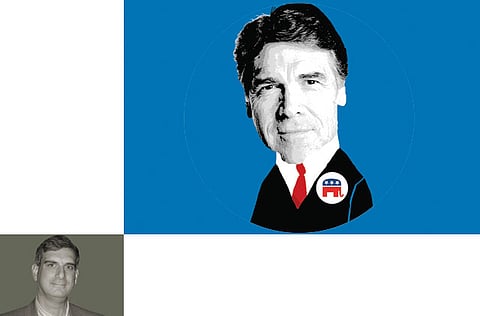Perry: More Bush than Bush himself
Texas governor offers whatever one liked or disliked about the former president in a highly concentrated form

Texas Governor Rick Perry is, by pretty much every account, the current frontrunner for the Republican Party's 2012 presidential nomination. Before I write a column about him, however, a disclaimer:
At this stage of the last American presidential cycle (i.e. in September of 2007) we all knew — absolutely knew — that the contest was already over. The only real question was who Rudy Giuliani and Hillary Clinton would pick as their running mates.
I say this to remind everyone that Americans are still a very long way from the winter days on which actual voters will cast the first actual votes of the 2012 campaign. A lot can change between now and February. So with the clear understanding that any discussion of a Perry juggernaut may sound pretty stupid a year from now, let's talk a bit about the Texas governor.
It is inevitable that people compare Perry with his predecessor in the Texas State House, George W. Bush. From a national/international perspective this comparison is easily summarised: Perry offers whatever you liked or disliked about Bush in a highly concentrated form.
For example, Bush's ‘Texas Swagger' was his calling card. Depending on your point of view it represented either everything that made him an authentic American, or everything that infuriated you (or, perhaps, both). In Texas itself, however, Bush was always seen as a bit of a poser.
Bush may have grown up in Texas, but his grandfather was a senator from Connecticut. The Bushes are the embodiment of what Americans call ‘old money' — meaning families that have been very rich for a very long time.
Bush ‘summered' in Maine, attended a fancy Massachusetts boarding school and later graduated from both Harvard and Yale. Culturally speaking, this is as far removed from Texas as, say, Jupiter.
Real thing
East coast types and foreigners may have winced at Bush's shoot-from-the-hip Texas style, but inside the Lone Star State his swagger always had an inauthentic ring. He was, as Texans say, "all hat and no cattle". If they elected him governor twice it was because they liked his politics, not because anyone bought into his faux-John Wayne posturing.
Perry, however, is the real thing. He grew up poor, attended a state university and except for a stint in the military has never lived outside Texas. This is a man who not only claims to wear a loaded gun when he goes jogging, but says he used it to kill a coyote during his morning run. More importantly, when he says these things, people believe him.
When Perry threatens violence against the head of America's central bank, refers to Social Security (the US old age pension programme) as a "ponzi scheme", dismisses climate change as a scam concocted by money-hungry scientists, and flaunts his religiosity he is merely talking the way a lot of Republican politicians in Texas talk all of the time.
Unlike Bush he does all of these things convincingly. His candidacy, therefore, seems set to test the validity of two key bits of 2012 conventional wisdom.
First, there is the idea that Tea Party support is essential to winning the Republican nomination. Perry, in many ways, is the ideal Tea Party candidate: as the long-serving governor of a big state he automatically qualifies as a plausible president.
Yet as someone who has long expressed scepticism about virtually everything the federal government does he appeals to the Tea Party's most basic instincts. Perry does not simply want smaller government — he wants there to be as little government as possible. This is what the Tea Party wants to hear, and Perry offers it in its purest form.
The second test involves the most fundamental of political questions. Which is more important: ideological purity, or winning? An early American statesman famously said he would rather "be right than president". Many Tea Partiers echo that sentiment — telling pollsters they want candidates who are "pure" in their conservatism. But in politics belief and practice are often two very different things. Many experts believe a truly pure Tea Partier has little chance of beating Barack Obama in a national election. Assuming this is so, will the Tea Party base chose noble defeat over compromised power?
It is a common failing of political activists on the ideological fringes to believe that they represent the true will of the masses when, in reality, the masses tend to be inert, not much interested in politics and (on the rare occasions that they think about it) frightened by what the fringes represent.
Neither Bush nor Obama was ever a fringe candidate or a fringe president, despite what both men's detractors would have you believe.
Perry is something else entirely. Should he emerge, 11 months from now, as the Republican nominee it will say a lot about where the GOP has gone — and where the country as a whole is headed.
Gordon Robison teaches political science at the University of Vermont.


